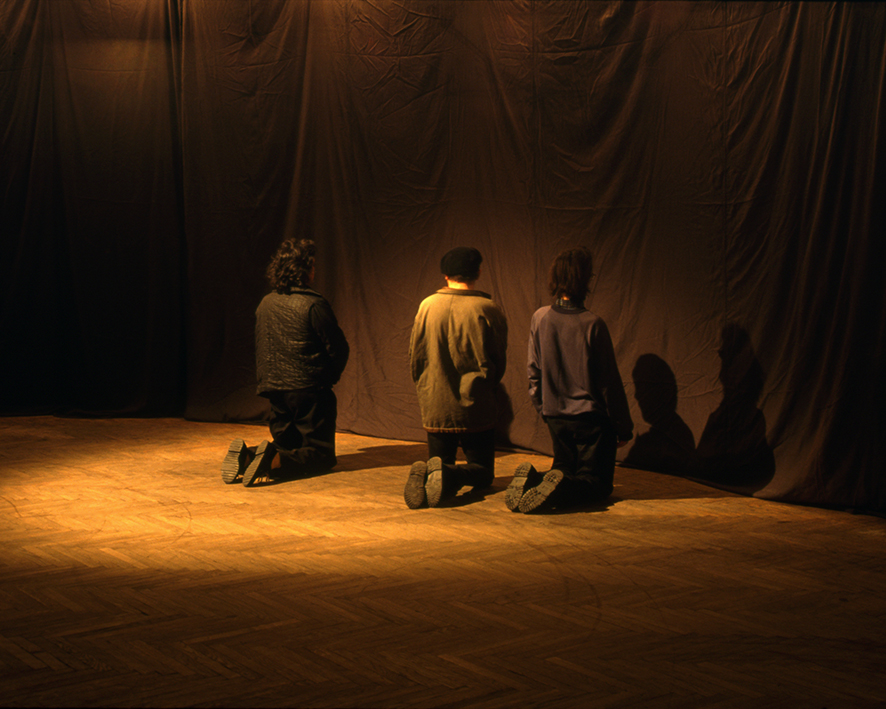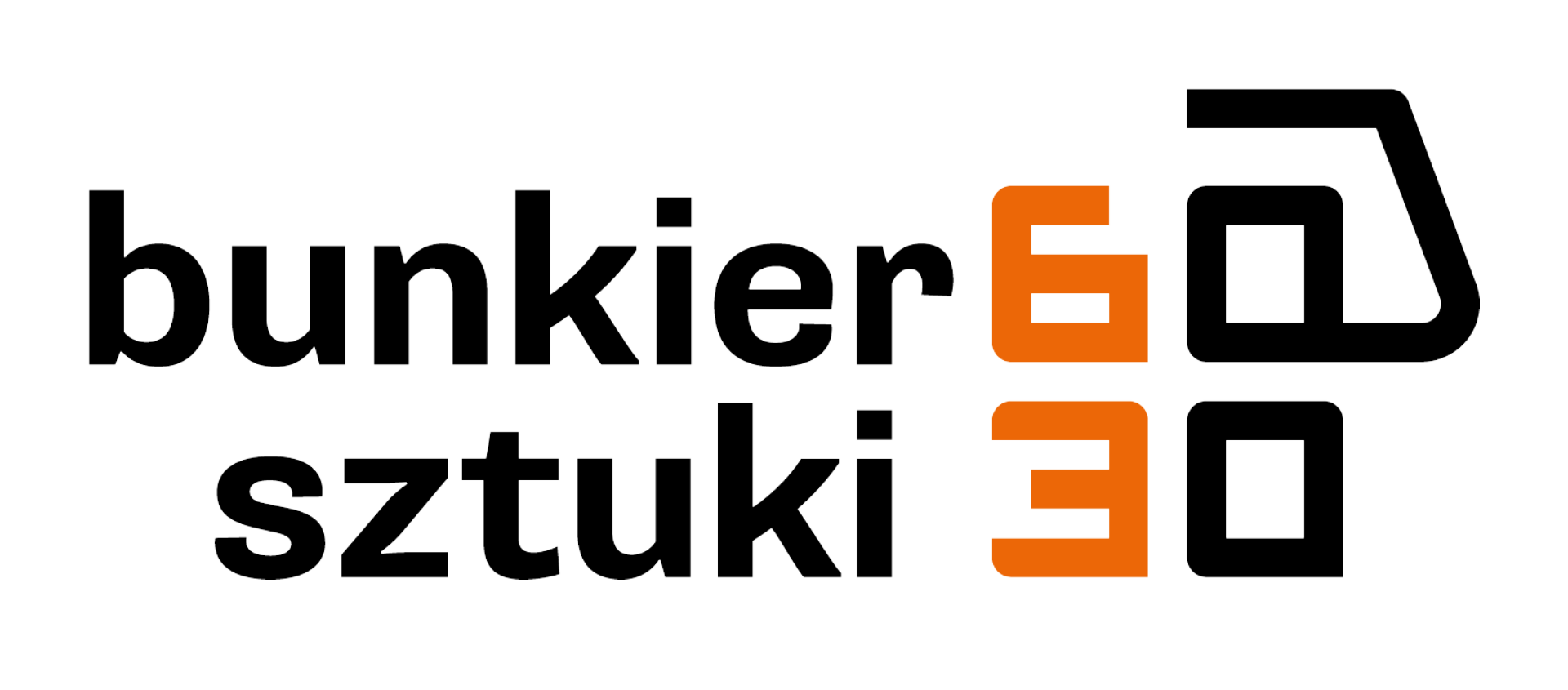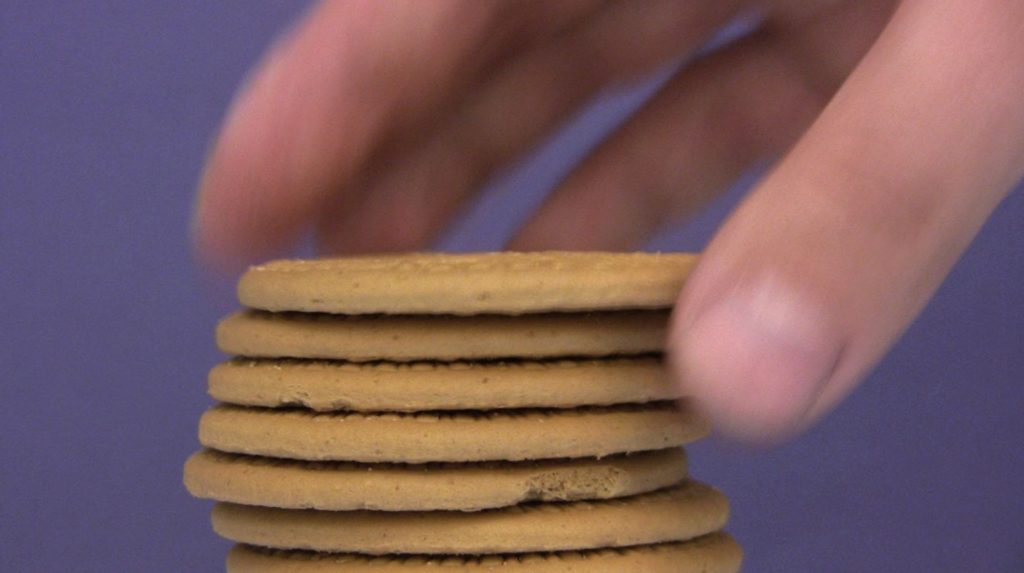You go begging and we will promote you
Stacja Pi.Stacja
Stacja Pi.Stacja is not so much an artistic formation as a state of mind, or as they like to call it, a “document, an event and a tape”. They say that life is much more interesting than art. Art’s existence is stimulated by social situations, the absurdity of the surrounding reality of the budding capitalism of the 1990s and a neo-Dadaist sense of humor resembling that of Alfred Jarry’s. As Rzepecki said of their work together in an interview: “Whatever happens, happens. Or nothing will happen. We can just sit around and do nothing”. It doesn’t matter whether we call this sitting sitting or art.
Stacja Pi.Stacja is formed in 1990, less than a year after the political transition and three years after the Stypa Kultury Sztuki [Pitch-In Culture Wake]. Its first joint performance takes place at the Mandala Theater. Adam Rzepecki, Katarzyna Pochrzęst and Grzegorz Zygier carry out a series of performative actions here. They act simultaneously, staging the drama performance Guzik [Button] and initiating the Prannie w Wannie [Laundry in the Bathtub] action. Rzepecki shows Śmierć Ajschylosa [Death of Aeschylus] and Painting on the Floor with TVs creating a spectacle of abstract forms and colors on the floor, Pochrzęst hangs paintings in the theater space that she pulls out of an old trunk, and Zygier embroiders on a white canvas a tangle of lines resembling Burda sewing patterns. They perform in the auditorium, whereas the audience sits on the stage. Further actions, with juicy titles: Nie pie*dol kwiatuszku [Cut the C**p, Honey] and Ty idź żebrać, a my w trójkę cię wylansujemy [You Go Begging and the Three of Us Will Promote You], are shown during the Kraków Theatrical Reminiscences. During the first performance, they simply kneel for several hours in silence, looking as if they are praying. Although it is not planned, the audience talks back, lies down next to them, reflecting sunbeams on the their backs and spilling Pepsi which they are sipping from wet glasses. During the second performance, the artists initiate a show with a more elaborate structure – the three of them jump into a small tub and hug splashing the water, only to try to splash it back in a moment later. They treat art as an extension of life’s activities. Sometimes they act spontaneously – action demands reaction. Out of boredom they disrupt a performance by Dick Higgins, at the sight of Gruppa artists with carnation flowers in their bottoms they shout: ‘Bravo, encore!’. Moments later they are throwing cakes at the audience from the stage, while at the Linz festival they manage to persuade their artist friends to swap identities during an interview for the Polish television.
The exhibition will feature, among others, photographs of the group with Tristan Tzara, Mieczysław Porębski’s notes to Prannie w wannie [Laundry in the Bathtub] painted over with drawings, the slapstick films Kapeluszowisko and Every Dog Has His Day, questioning the existence of gravity and at the same time ostentatiously exposing the illusion of the glass screen, as well as a number of photographs and archival materials documenting the group’s performative activities. The central element of the exhibition, as in the Mandala Theatre, is the bathtub, the visual motif is the color pistachio green, and the strategy around which the narrative is constructed – trickster novel – which, like the stories told by Stacja Pi.Stacja, treats truth and fiction as equivalent parts of the same story.
Timeline:
1987: Stypa Kultury Zrzuty [Pitch-In Culture Wake] at the Mandala Theater.
1990: Katarzyna Pochrzęst, Grzegorz Zygier and Adam Rzepecki start using the name Stacja Pi.Stacja
9-10 March 1990: Prannie w wannie [Laundry in the Bathtub] action at the Gallery of the Mandala Theater in Kraków. A paratheatrical performance based on a drama entitled Guzik [Button], which was partially set in the bathtub, and simultaneous performance actions and an exhibition that displayed Rzepecki’s Painting on the Floor, Kącik Patriotyczny [Patriotic Corner] and Śmierć Ajschylosa [Death of Aeschylus], Transmission Line and Wykroje [Patterns] by Grzegorz Zygier, and paintings and postcards by Katarzyna Pochrzęst. Their joint film Every Dog Has His Day also premiered at the Mandala.
3-5 May 1990: Arge Querspur – Videofestival in Linz.
Among other films, they showed Every Dog Has His Day. They also gave an interview for the Polish Television, for the Pegaz [Pegasus] program, and swapped roles with other festival participants, e.g. Zbigniew Libera and Zygmunt Rytka. The material was never broadcast.
November 1990: Uitg Ave – Audio-Visual-Experimental Festival in Arnhem.
Once again they show the film Every Dog Has His Day. Adam Rzepecki also shows the film Cóż arystokracie po małym fiacie? [What Does an Aristocrat Need the Little Fiat for?], Painting on the Floor and Rozmowa – czyli TV-kepharus [Conversation – or TV-kepharus], while Grzegorz Zygier shows his installations – Pulsar and Transmission Line. At the same time they also go to Amsterdam and visit Henryk Gajewski. Zbigniew Libera distracts Gajewski, and they steal a film. Earlier it was Gajewski who didn’t return Rzepecki’s Encounters with Duchamp and Tzara. They take the tape at random. It happens to be one of a vacation in Zakopane. They plan to use it in further activities.
18-21 March 1993: 18th Kraków Theatrical Reminiscences – Rotunda Academic Cultural Center of Jagiellonian University. They perform Nie pie*dol kwiatuszku [Cut the C**p, Honey] – for an hour and a half they kneel with their faces to the wall, their backs to the audience, in complete silence. Paweł Filas joined the group at the time. As Paweł Głowacki wrote in a review for Tygodnik Powszechny: “This flower was in fact not very aggressive – it consisted of an hour and a half of kneeling by three artists with their faces to the wall, their backs to the audience and in complete silence. That was it. People came in, then came out, sipped Pepsi in ‘wet’ glasses, chatted about this and that, every now and then checking the status quo: ‘Are they kneeling?’ – ‘They’re kneeling.’”
26-27 November 1993: Zderzak Gallery in Kraków. They show the films Kapeluszowisko and Hommage à Wierszyłowski, created by Katarzyna Pochrzęst in collaboration with Zygier and Rzepecki. The artists ostentatiously give up attending the opening at the last minute. They go to a pub across the street from the gallery and watch the visitors entering and leaving, sipping beer in hiding.
23-26 March 1995: 20th Kraków Theatrical Reminiscences – Rotunda Academic Cultural Center of the Jagiellonian University. Stacja Pi.Stacja shows paratheatrical activities entitled Ty idź żebrać, a my w trójkę cię wylansujemy [You Go Begging and the Three of Us Will Promote You]. They are once again joined by guest artist Paweł Filas. The artists jump into an old-fashioned laundry tub, splash water out of it, and then try to splash it back in. As you can read in a review in Gazeta Krakowska: ‘After a long time, the movements of the legs in the tub become nervous, jagged. In a moment, everything quiets down, and after a while, the sounds are again incoherent (or coherent). And so on for 35 minutes. The action ends with the artists pouring water on one another, chasing one another around the stage, and general chaos.’
4 June 2009: Olympia Gallery in Kraków. Grzegorz Zygier during the opening of the group exhibition (r)EVOLUTION efficiently replaces Adam Rzepecki and paints his work on the wall. It’s crowded. Olimpia Maciejewska convinces less-informed viewers that he is, in fact, Adam Rzepecki.
4 June 2015 Olympia Gallery. Performance by Stacja Pi.Stacja consisting of Adam Rzepecki and Grzegorz Zygier – Hac urgent lupus hac canis during the exhibition 16 lat I siedem dni albo sztuki niepiękne czyli spadkobiercy Duchampa [16 Years and Seven Days or Unbeautiful Art, i.e. Duchamp’s Heirs]. Dressed smartly, in white shirts, they sit at a plated table and look into each other’s eyes for a long time. The action ends with a surgical slitting of the skin on their fingers, a fraternity of blood and spitting.
Adam Rzepecki was born in 1950 in Kraków. He studied art history at the Jagiellonian University in Kraków. Since 1979 he has been a member of the Łódź Kaliska group, and since 1990 of the Stacja Pi.Stacja group. From 1978 to 1981 he ran the famous Jaszczury Gallery of Photography in Kraków. In the 1980s, he co-founded the Kultura Zrzuty [Pitch-in Culture]. He has participated in all exhibitions by Łódź Kaliska. His works may be found in Polish and foreign museum collections, including the National Museum in Kraków, the Museum of Art in Łódź, the Ujazdowski Castle Center for Contemporary Art in Warsaw and Sammlung Verbund in Vienna. He lives and works in Kraków.
Katarzyna Pochrzęst was born in Lublin. She is a graduate of the Faculty of Sculpture at the Academy of Fine Arts in Kraków. She defended her diploma in 1986 in Prof. Jerzy Bandura’s studio, creating the semi-monument Menora – Przemijanie [Menorah – Passing]. She co-founded the Stacja Pi.Stacja group. Her artistic output includes many solo and group exhibitions, including performances. In addition to symbolic realism, she creates abstract compositions and other sculptural forms. Signing her works, she also uses generational names – Bober and Levinson. She lives and works in Warsaw.
Grzegorz Zygier was born in 1954 in Piotrków Trybunalski. A photographer, performer, and video artist; he graduated from the Kraków University of Technology. From 1981 to 1982 he was a member of the SEM art group. From 1982 to 1988 he was associated with the Kultura Zrzuty [Pitch-in Culture] art movement and the independent magazines ‘Tango’ and ‘Hali Gali’. Participant and documentarist of events and artistic meetings: the Teofilów open air, Nieme Kino [Silent Cinema], Festiwal Sztuki Potrzebnej [Needed Art Festival], etc. He is one of the co-founders of the Stacja Pi.Stacja group. In 1988 he received a creative scholarship from the City of Kraków, and in 2009 a scholarship from the Minister of Culture and National Heritage. He has been a member of ZPAF since 1987. He lives and works in Kraków.
Artists: Katarzyna Pochrzęst (Bober), Adam Rzepecki, Grzegorz Zygier, Paweł Filas and (guests) Tristan Tzara, Dick Higgins, Jerzy Beruś, Zygmunt Rytka, Mieczysław Porębski, Ryszard Grzyb
Curator: Ania Batko
Coordinator: Renata Zawartka


